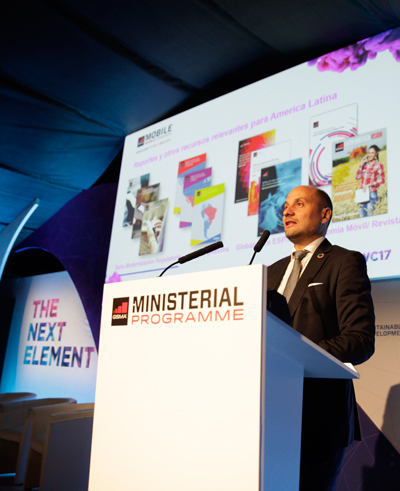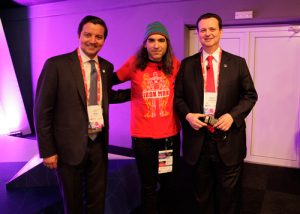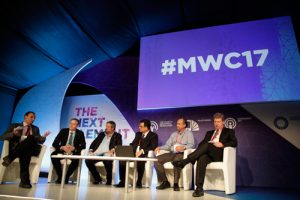The Latin American session of Ministerial Programme 2017 once again brought together all the key players from Latin American ICT public policy, private and public sectors and international organisations. The topic uniting them on this occasion was how to defend user security and privacy in the changing context of IP services, multiple devices and encryption brought by the new digital ecosystem.
 Mobile World Congress 2017 enjoyed another record-breaking year, with more than 108,000 visitors from 208 countries, including 55 per cent C-Level attendees and 6,100 CEOs. The Latin Americans were key figures of Ministerial Programme 2017, with 76 attendees from 15 countries in the region.
Mobile World Congress 2017 enjoyed another record-breaking year, with more than 108,000 visitors from 208 countries, including 55 per cent C-Level attendees and 6,100 CEOs. The Latin Americans were key figures of Ministerial Programme 2017, with 76 attendees from 15 countries in the region.
Safeguarding Security and Privacy in Latin America, part of the Ministerial Programme, was the only session of all the MWC17 events held in Spanish and Portuguese. The session was opened on Monday 27 February by Sebastián Cabello, Head of Latin America, GSMA, who highlighted the strong leadership and the prominent role of the region in the debate on digital ecosystem security and the regulatory modernisation required. The seminar took place alongside the launch of the report Safety, privacy and security across the mobile ecosystem produced by the GSMA and AT Kearney.
The first keynote of the session was given by Chema Alonso, Chief Data Officer of Telefónica, who explained how the criminal world has shifted from the physical to the digital realm. However, with smartphone WiFi use at 85 per cent and encrypted communications through OTTs, security regulation currently reaches only one per cent of all communications. Therefore, the question Alonso raised was whether internet companies need to be regulated when cyber criminals can easily move from one application to another if they are blocked, as happened, for example, in Brazil.
 The session continued with a panel including Brazil’s Minister of Science, Technology, Innovation and Communications, Gilberto Kassab, and Colombia’s ICT Minister, David Luna Sánchez, moderated by Cabello. “All companies must respect Brazil’s constitution. The judicial block on Whatsapp was crime related, but there was no interference in privacy or neutrality,” said Kassab. ICT Minister Sánchez said Colombia is focusing on digital security, aiming to define legislation that takes governance and national security into account, as well as issues faced by the public. “It’s important to highlight the coordinated work we carried out with companies in Colombia that are 100 per cent committed: it’s essential to have a comprehensive approach and include the public in decisions,” he said.
The session continued with a panel including Brazil’s Minister of Science, Technology, Innovation and Communications, Gilberto Kassab, and Colombia’s ICT Minister, David Luna Sánchez, moderated by Cabello. “All companies must respect Brazil’s constitution. The judicial block on Whatsapp was crime related, but there was no interference in privacy or neutrality,” said Kassab. ICT Minister Sánchez said Colombia is focusing on digital security, aiming to define legislation that takes governance and national security into account, as well as issues faced by the public. “It’s important to highlight the coordinated work we carried out with companies in Colombia that are 100 per cent committed: it’s essential to have a comprehensive approach and include the public in decisions,” he said.
 At the end of the session a discussion panel was held on the collaboration required between government and mobile operators to tackle security challenges in the digital world. The participants were Sergio Quiroga Da Cunha, Head of Region Latin America Ericsson; Juan Carlos Archila, Vice President of International Affairs América Móvil; Miguel de Godoy, President of National Communications Agency (Enacom), Argentina; Juan Pablo Calvo, CEO Nuevatel Viva; and Gilbert Camacho, President of SUTEL Costa Rica. “Regulators and mobile operators must be congratulated on their high proactivity in tackling handset theft, child abuse images and fraud from prison, but we must keep working to develop the tools that allow users to be part of the information protection solution as well,” said Archila.
At the end of the session a discussion panel was held on the collaboration required between government and mobile operators to tackle security challenges in the digital world. The participants were Sergio Quiroga Da Cunha, Head of Region Latin America Ericsson; Juan Carlos Archila, Vice President of International Affairs América Móvil; Miguel de Godoy, President of National Communications Agency (Enacom), Argentina; Juan Pablo Calvo, CEO Nuevatel Viva; and Gilbert Camacho, President of SUTEL Costa Rica. “Regulators and mobile operators must be congratulated on their high proactivity in tackling handset theft, child abuse images and fraud from prison, but we must keep working to develop the tools that allow users to be part of the information protection solution as well,” said Archila.
Discussion on the Regional Digital Market in Latin America
On Tuesday 28 February, in the Ministerial Programme, the Roundtable on the Regional Digital Market in Latin America was held, jointly organised by CAF – Development Bank of Latin America, Cullen International and the GSMA, with more than 40 high level guest participants representing government agencies in the region, regulatory authorities, international organisations and digital ecosystem companies.

Participants in the discussion on how to encourage digitisation to maximise the benefits brought to Latin American society by connectivity included Mario Cimoli, Head of Production, Productivity and Management Division, ECLAC; Doyle Gallegos, Lead ICT Policy Specialist, World Bank; Isabelle Mauro, Head of Digital Communications, WEF; Oscar León, Executive Secretary of CITEL (OEA); Mónica Aspe, Undersecretary of Telecommunications, Mexico; Germán Darío Arias, Executive Director of the CRC, Colombia; Miguel Ángel de Godoy, President of ENACOM Argentina; and Gilbert Camacho, President of the Board, SUTEL Costa Rica.
The GSMA Ministerial Programme at MWC 2017 also beat its attendance record during four days of seminars, activities and bilateral meetings, with attendees representing 167 countries across the globe, including some 60 ministers and 78 heads of regulatory authorities.
Resources
- 4G Connections in Latin America more than doubled in a year, reveals new GSMA Intelligence data.
- Record-breaking year for GSMA Mobile World Congress as 108,000 attend industry’s premier event.
- Report: Safety, Privacy and Security across the Mobile Ecosystem.
- GSMA Intelligence Mobile World Congress 2017 wrap-up.
- Mobile World Live video of MWC17 highlights.